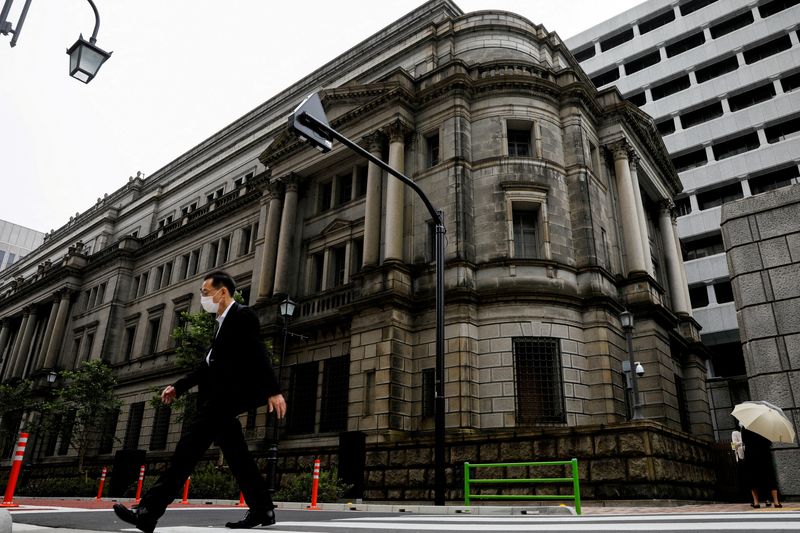By Tetsushi Kajimoto and Leika Kihara
TOKYO (Reuters) - Japan next year will consider revising its decade-old blueprint for fighting deflation, sources said, as financial markets bet that a weak yen and rising consumer prices will force the central bank to finally drop its ultra-loose monetary policy.
The government could initiate the revision after a new Bank of Japan (BOJ) governor is appointed in April, they said, a move that may heighten the chance of a tweak to incumbent governor Haruhiko Kuroda's ultra-loose monetary policy.
Under strong pressure by then-Prime Minister Shinzo Abe to take bolder steps to beat deflation, the BOJ signed the joint statement with the government in 2013 and committed itself to achieve its 2% inflation target "at the earliest date possible".
The pledge has served as the backbone of Kuroda's radical monetary stimulus and justification for keeping Japan's interest rates ultra-low, even as other central banks tighten monetary policy to combat stubbornly high inflation.
Some officials of Prime Minister Fumio Kishida's administration are keen to revise the statement that focuses on steps to beat deflation - a goal that has become out of sync with recent rises in inflation, they said.
"Given we'll have a new BOJ governor, there will likely be a new statement," one of the government officials said. "But there's no decision yet on what a new one could look like," the source said. A second official echoed that view.
Kyodo news agency reported on Saturday that the government is set to revise the joint statement to make the BOJ's inflation target a more flexible goal, with some leeway.
The yen jumped 0.5%, the Nikkei stock average fell to a six-week low and Japanese government bonds came under selling pressure on Monday as investors took the news as heightening the chance of a stimulus withdrawal.
When asked about Kyodo's report, Chief Cabinet Secretary Hirokazu Matsuno told reporters on Monday there was no truth the government is set to revise the statement.
SHIFTING FOCUS
A revision to the joint statement would mark the final nail in the coffin for former premier's Abenomics stimulus programme, which relied heavily on Kuroda's massive stimulus to pull Japan out of deflation.
Aside from putting the BOJ responsible to achieving 2% inflation, the joint statement laid out the role the government would play, such as undertaking deregulation and structural reforms to boost the economy's growth potential.
Analysts say any revision that waters down the status of the BOJ's 2% inflation target could serve as a trigger for phasing out Kuroda's stimulus programme.
"Under a slightly modified new joint statement, the BOJ's 2% inflation target could become a long-term goal," rather than one that must be met at the earliest date possible, said Toru Suehiro, an economist at Daiwa Securities. "The purpose of the revision could be to phase out Abenomics."
While inflation has exceeded the BOJ's 2% target for seven straight months as of October, Kuroda has called for the need to maintain ultra-easy policy until wages rise more. The BOJ is set to leave monetary settings unchanged at a two-day meeting ending on Tuesday.
But markets are rife with speculation the BOJ could tweak yield curve control (YCC) - a controversial policy combining a negative short-term rate target with a 0% cap on the 10-year bond yield - when Kuroda's second, five-year term ends in April.
Nearly half of economists polled by Reuters in December said they expect the BOJ to unwind its ultra-loose policy between March and October next year.
Sources have told Reuters that debate over how to remove the BOJ's yield cap could gather pace next year, provided wages perk up and major economic risks remain contained.
Kishida's administration has seen its approval ratings plunge on growing public anger over the rising cost of living, as the BOJ's ultra-low interest rate policy fuels a yen plunge that boosts import costs.
Former BOJ Deputy Governor Hirohide Yamaguchi, who is considered a candidate to succeed Kuroda, told Reuters the central bank must stand ready to raise its yield target if the economy can withstand overseas risks.
"There's a chance core consumer inflation may stay around 3-4% for a fairly long period," Yamaguchi said. "Once inflation expectations become entrenched, it's very hard for central banks to control them. That's a risk the BOJ should be mindful of."
